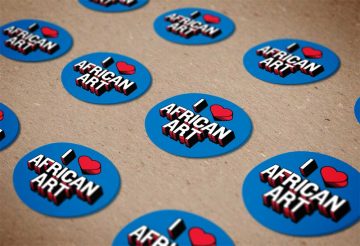
Independent Africa Faces Forward
“We face neither East nor West: we face forward.”
—Kwame Nkrumah, Commonwealth Prime Minister’s Conference, 1960
El Anatsui
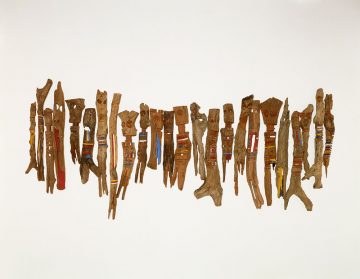
b. 1944, Anyako, Volta Region, Ghana
Works in Nsukka, Enugu State, Nigeria
The Ancestors Converged Again
1995
Wood, tempera
Purchased with funds provided by the Annie Laurie Aitken Endowment, 98-11-1
Heroes in History: Ghana’s “Big Six” Independence Leaders
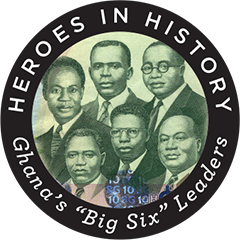
They organized Ghana’s first political party, channeling constructive impatience into a campaign for independence.
- The ‘Big Six’ were the leaders of the United Gold Coast Convention (UGCC), a political party founded by J.B. Danquah in 1947 to push for self-government.
- On Feb. 28, 1948, a peaceful demonstration in Accra for pay owed by veterans who fought for Britain in World War II was met with gunfire, killing three people. Horrified by the incident, the ‘Big Six’ called for full and immediate self-rule. They were all arrested.
- In prison, the group earned their collective nickname, and became a symbol for the country’s self-determination. One—Kwame Nkrumah—would use the added notoriety to build a new political party, which would eventually carry him to power.
“...Unless Colonial Government is changed and a new Government of the people and their Chiefs installed at the centre immediately, the conduct of masses now completely out of control with strikes…will continue…Working Committee United Gold Coast Convention declare they are prepared and ready to take over interim Government. We ask in name of oppressed, inarticulate, misruled and misgoverned people and their Chiefs that Special Commissioner be sent out immediately to hand over Government to interim Government of Chief and People and to witness immediate calling of Constituent Assembly.”
—Telegram from United Gold Convention leaders (Accra) to Secretary of State (London), Feb. 28, 1948Chant Avedissian
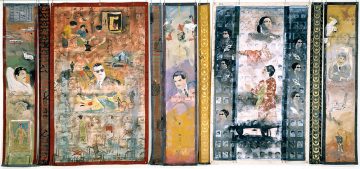
1951–2018, b. Cairo, Egypt
Worked in Cairo
The Nasser Era and Om Kalsoum
c. 1994
Mixed media on corrugated cardboard, cloth
Purchased with funds provided by the Smithsonian Collections Acquisition Program, 96-20-3
Heroes in History: Gamal Abdel Nasser and Om Kalsoum
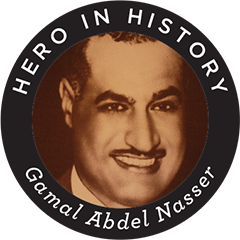
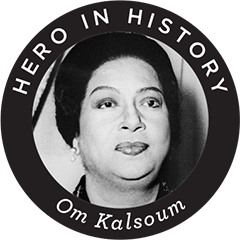
- A military officer, Nasser helped to overthrew the monarchy, led Egypt from 1954 until his death in 1970, nationalized the Suez Canal from British and French interests, and became an icon of secular pan-Arab nationalism.
- Never short on an ambition, Nasser saw himself as a potential leader for Arab-speaking countries, for Africa, and for the greater Islamic world. From 1958-1961, he led Egypt and Syria jointly in a United Arab Republic.
- Nasser’s legacy is complicated—he was a symbol of anti-colonial solidarity, built the Aswan Dam, and led the industrialization of Egypt, yet he also ruled a police state and fought and lost two wars with Israel.
“Let them kill Nasser! What is Nasser but one among many? I am alive, and even if I die, all of you are Gamal Abdel Nasser!”
—Gamal Abdel Nasser, after surviving an assassination attempt in 1954 Om Kalsoum “The Star of the East,” “Egypt’s Fourth Pyramid”—she was nothing less than The Voice.- One of the twentieth century’s most celebrated global vocal artists, Kalsoum was known for her talent, musical virtuosity, and glamour.
- Kalsoum interpreted modern and classical Arab verse through improvisation and vocal stylization. She was known to riff and extend a song at considerable length, if the audience’s emotions were with her.
- Throughout the century’s turmoil, Kalsoum maintained a reputation as a patriotic Egyptian and a devout Muslim—and a good friend of Nasser’s.
“O Nile, you have been praised by God and celebrated in the Torah. The origin of civilisation around you is a fact, and its outcome is your virtue. It was born and you were its cradle… The people, who were privileged and protected over centuries, are thankful to you. They express their gratitude to the Lord for His creation. And may God keep on His blessings.”
—Om Kalsoum, singing one of her signature songs, “Al Nil” (lyrics by Ahmad Shawqi)Eliot Elisofon
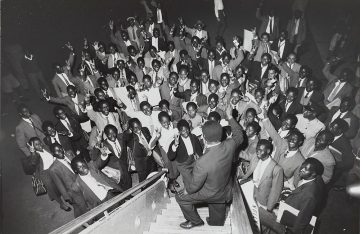
1911–1973, b. New York
Worked throughout Africa, 1947–72
Thomas Mboya welcomes university students onboard the first Kennedy “airlift”
Nairobi, Kenya
September 7, 1959
Photograph
Eliot Elisofon Photographic Archives, EEPA EENG 1973-001-0615
National Museum of African Art
Courtesy Time & Life Pictures/Getty Images
Hero in History: Thomas Mboya
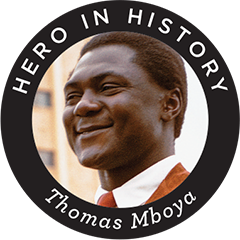
- A labor activist from an early age, Mboya organized his fellow Nairobi civil servants into the Kenya Local Government Workers’ Union in the early 1950s. Mboya became general secretary of the national Federation of Labour, where he won an international profile by helping striking dock workers in Mombasa get a 33 percent pay raise.
- Simultaneously, Mboya joined the nascent independence party, the Kenya African National Union (KANU). When the British banned the party and most of its leaders its years during the Mau Mau conflict, Mboya was entrusted with the party’s control.
- Mboya is celebrated for organizing the initial ‘airlifts’ that provided scholarships to young Kenyans seeking study in the United States—a program with an impressive legacy of achievement.
- An outspoken critic of government corruption, Mboya was serving as a government minister when he was assassinated in 1969. The cause of the murder has never been determined.
“I have news for you. There is no Superman. It’s up to us.”
—Tom Mboya“Pan-Africanism is changing the arbitrary and often illogical boundaries set up by the colonial powers in their mad scramble for Africa. Many…are asking us what sort of governments we hope to set up when our freedom is won…What we shall create should be…enriched by our ability to borrow…what is good from other systems, creating a synthesis of this with the best of our own systems and cultures.”
—Tom Mboya, speaking at Makerere University, Kampala, Uganda, 1958Unidentified artist
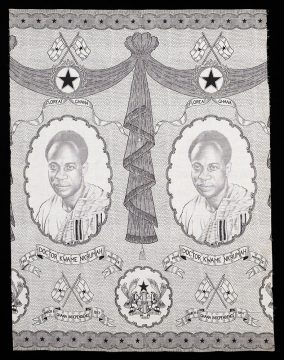
Ghana
Factory-printed cloth (Prime Minister Kwame Nkrumah)
1957
Cotton, dye
Gift of Donald A. Theuer and Lilburne Theuer Senn, 2002-9-32
Hero in History: Kwame Nkrumah
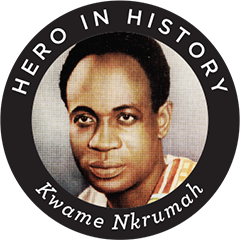
- Breaking with more moderate politicians seeking eventual independence, Nkrumah formed the Convention Peoples’ Party (CPP) as a platform through which to organize a campaign of strikes, protests, and non-violent non-cooperation against the British.
- Nkrumah’s CPP won early elections under British rule and, when independence came in 1957, he became the new nation of Ghana’s first prime minister. Ghana had become the first colonized African nation south of the Sahara to win back its freedom.
- Nkrumah was an outspoken advocate for Pan-Africanism, as both a cultural and political platform, from which he anticipated Ghana would lead the rest of the continent from occupation. He became a global symbol for black liberation.
- In government, Nkrumah’s government became increasingly authoritarian. He won a referendum in 1960 that made Ghana a republic; he became president (and ‘president for life’ in 1964).
- Ghana’s army staged a coup in 1966, ousting Nkrumah from power. He would live the remainder of his life in exile. Ghana would face a series of intermittent, disruptive military coups in the following three decades.
“We face neither East nor West: we face forward.”
—Kwame Nkrumah, conference speech in Accra, 1960“I am not African because I was born in Africa, but because Africa was born in me.”
—Kwame NkrumahUnidentified artist
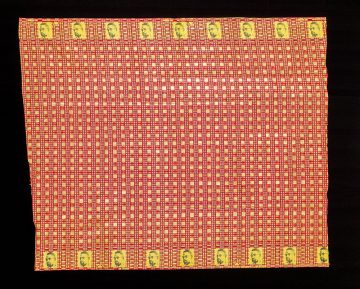
Senegal
Factory-printed cloth (Malcolm X)
Late 20th century
Cotton, dye
The Wil and Irene Petty Collection, 2008-5-62
Hero in History: Malcolm X
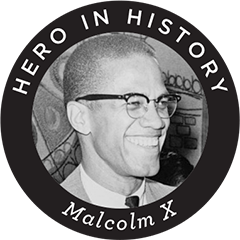
- Malcolm Little converted to the Nation of Islam, an African-American organization that combined Islamic teachings with black nationalism, while incarcerated between 1946 and 1952. He adopted the new surname “X.”
- Malcolm X quickly became one of the Nation’s most prominent leaders and public advocates, articulating positions of black racial pride while giving voice to a generation of black Americans’ frustrations during the civil rights movement. He was the intellectual leader of the United States’ growing Black Power movement.
- Malcolm X publicly fell out with the Nation of Islam’s leadership in 1963. He credited his hajj to Mecca the following year as a second conversion, taking the name El Hajji Malik El-Shabazz.
- Newly awakened to a sense of global solidarity with brothers and sisters throughout the formerly colonized world, Malcolm became an advocate of Pan-Africanism—arguing that African-Americans’ struggles intersected with global struggles for liberation.
- Malcolm X was assassinated while speaking in Harlem on Feb. 21, 1965. Three members of the Nation of Islam were convicted of the murder and sentenced to life in prison.
- His memoir, The Autobiography of Malcolm X (1965), would become a global touchstone—the story of a man’s journey from a troubled childhood to human rights activist and global icon of black solidarity.
“…During the past eleven days here in the Muslim world, I have eaten from the same plate, drunk from the same glass—while praying to the same God—with fellow Muslims, whose eyes were the bluest of blue, whose hair was the blondest of blond, and whose skin was the whitest of white. And in the words and in the actions and in the deeds of the ‘white’ Muslims, I felt the same sincerity that I felt among the black African Muslims of Nigeria, Sudan, and Ghana. We were truly all the same…I could see from this, that perhaps if white Americans could accept the Oneness of God, then perhaps, too, they could accept in reality the Oneness of Man…”
—Malcolm X, in a 1964 letter from Mecca, following his hajj. “As long as we think that we should get Mississippi straightened out before we worry about the Congo, you’ll never get Mississippi straightened out.” —Malcolm X, New York, 1964, addressing his newly formed Organization for Afro-American UnityBenedict Enwonwu MBE
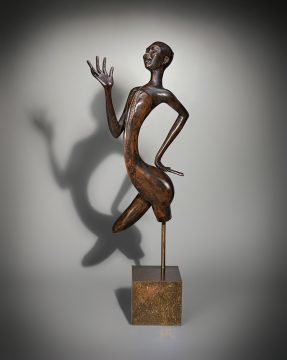
1917–1994, b. Onitsha, Anambra State, Nigeria
Worked in Umuahia, Abia State and Ife, Osun State, Nigeria, and London
Africa Dances
1980
Cold-cast bronze resin
Museum purchase, 2016-15-1
Ben Enwonwu is arguably one of 20th-century Africa’s most important and influential artists. Recognized worldwide for his modernist examinations of Nigerian and pan-African ideas and images by mid-century, his work came to represent African self-determination, innovation, and excellence in an era in which the continent was finally regaining its sovereignty.
The Africa Dances series, begun in 1949 as a response to performances observed in his home city of Onitsha, became a subject to which Enwonwu would return throughout his career. In the series of sculptures made between 1980 and 1984, the artist isolated each figure in space, imbuing their features with a liquid flow that captured the essence of a body in motion.
This piece is a cold-cast resin predecessor to a 1982 bronze casting of Africa Dances. Identical in form to the later bronze, the cold-cast resin version was likely cast, because of its material, by the artist himself. Enwonwu also likely painted the surface of this piece in order to understand how the light would play across its form.
Hero in History: Miriam Makeba
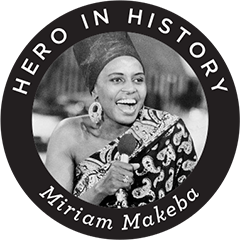
- Raised on the outskirts of Sophiatown, a township on the outskirts of Johannesburg, Makeba rose in prominence singing in South Africa in the early 1950s. Her appearance in an anti-apartheid documentary caught the attention of Harry Belafonte, who invited her to the United States in 1959.
- In the U.S., Makeba recorded a large number of songs, in Xhosa, Zulu, and English. She became a global celebrity, and one of the continent’s most recognized faces and voices, bringing African music to many Western audiences for the first time. She was the first African artist to win a Grammy, in 1965, with Belafonte.
- The South African government refused her re-entry to the country in 1960; it would ban her records and revoke her passport in 1963. Makeba, meanwhile, became a vocal and highly visible critic of the apartheid regime, both in her songs and in her growing role as a civil rights activist.
- After marrying Black Panther leader Stokely Carmichael in 1968, Makeba and her husband left the U.S., first for Guinea. She would tour Europe and Africa in the decades that followed, performing at a number of new African nations’ independence celebrations.
- Nelson Mandela invited Makeba to return to South Africa in 1991—the freedom she had called for had finally come to her homeland. She was named a United Nations Goodwill Ambassador in 1999 and continued to speak out for humanitarian causes.
